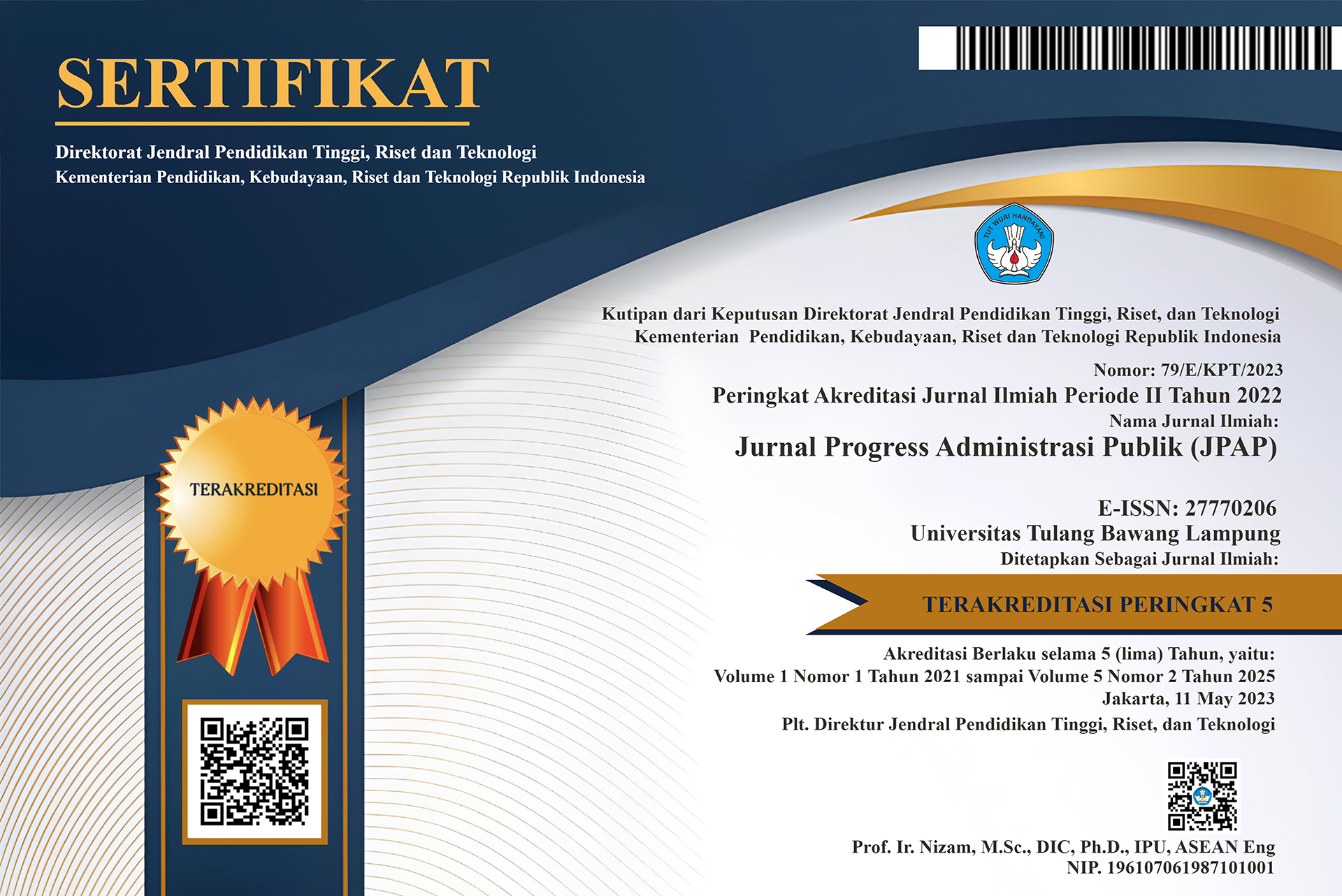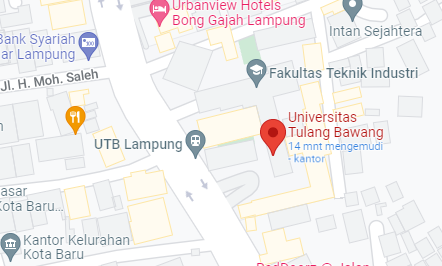IMPLEMENTASI GOOD GOVERNANCE PADA MALL PELAYANAN PUBLIK PEMERINTAH KOTA BOGOR
DOI:
https://doi.org/10.37090/jpap.v3i2.1180Abstract
This research explores the implementation of Good Governance principles in the Public Service Mall (MPP) application in the Government of Bogor City. Data collection was conducted by distributing questionnaires to 50 respondents. The results of the data analysis using multiple linear regression reveal interesting findings related to the factors influencing the usage of the MPP in the context of local government. The research findings indicate that transparency and accountability have a significant impact on the intensity of MPP usage. Transparency plays a crucial role in fostering trust and efficiency in public administration. Citizens feel confident because the application provides comprehensive and accurate information, offering a transparent view of public service processes. Accountability has also been proven to influence MPP usage. Financial information, compliance, and government reporting within the application motivate users. When the government adheres to strong accountability principles, people are more likely to feel confident and motivated to interact with the application. However, another interesting finding is that legal certainty does not have a significant impact on the intensity of MPP usage. The application focuses on innovation and the efficiency of public services, making legal factors less crucial in determining its usage. As a recommendation, this research suggests the need for enhancing the information presented in the application and providing regular training to users. This is aimed at maintaining the sustainability and success of the MPP application's implementation within the context of Good Governance in Bogor City. Consequently, the MPP application can continue to provide maximum benefits to both the public and local government.
Keywords: good governance; transparency; accountability; rule of law; public service mall.
Downloads
References
Aisyah, A. (2021). Pengaruh Good Governance pada Pengelolaan Aset Tetap Pemerintah Daerah. Majalah Media Perencana, 2(1), 145–152.
Andhini, S. Y., Wahyudi, S., & Khannanah, S. F. (2023). Implementasi Prinsip-Prinsip Good Governance Dalam Meningkatkan Kualitas Pelayanan Publik (Studi Kasus Pada Sekretariat DPRD Kota Malang). JISIP (Jurnal Ilmu Sosial Dan Pendidikan), 7(3), 2112–2117.
Andriyadi, F. (2019). Good Governance Government and Government. LENTERA: Indonesian Journal of Multidisciplinary Islamic Studies, 1(2), 85–100.
Asmawati, A. (2023). PRINSIP-PRINSIP GOOD GOVERNANCE DALAM PENYELENGGARAAN PELAYANAN BERBASIS ONLINE E-KTP DI DAERAH. JPAP: Jurnal Penelitian Administrasi Publik, 8(2 SE-Articles). https://doi.org/10.30996/jpap.v8i2.8049
Asvianty, M. A., Laksono, M. K. W., & Djasuli, M. (2022). Implementasi Good Corporate Governance Pada Bidang Perindustrian Ditinjau Dari Perspektif Islam. Jurnal Ekonomika Dan Bisnis, 2(1), 929–932.
Darmawan, D. (2013). Metode penelitian kuantitatif.
Darmi, T. (2016). Penerapan Prinsip Good Governance Untuk Layanan Publik. Jurnal Administrasi Pembangunan, 4(2), 97–102.
Deviani, N. A., Novaria, R., & Widiyanto, M. K. (2022). penerapan sistem akuntabilitas kinerja instansi pemerintah (sakip) dalam mewujudkan good governance: Studi Pada Dinas Koperasi Dan Usaha Mikro Kabupaten Sidoarjo. PRAJA Observer: Jurnal Penelitian Administrasi Publik (e-ISSN: 2797-0469), 2(03), 115–120.
Dewirahmadanirwati, D. (2018). Implementasi Otonomi Daerah Dalam Mewujudkan Good Governance di Daerah Sumatera Barat: Indonesia. Jurnal Ilmiah Pendidikan Scholastic, 2(3), 43–50.
Guntoro, D. (2019). Implementasi Kebijakan Anggaran Menuju Good Governance. Visioner: Jurnal Pemerintahan Daerah Di Indonesia, 11(5), 847–857.
Ilhami, R. (2020). Implementasi Pelayanan Konsultasi Perpajakan Pada Mall Pelayanan Publik. DECISION: Jurnal Administrasi Publik, 2(2).
Jannah, L. M. (2019). Metode penelitian kuantitatif.
Kodarisman, R., & Nugroho, E. (2013). Evaluasi Penerapan Sistem Informasi Manajemen Kepegawaian (SIMPEG) di Pemerintah Kota Bogor. Jurnal Nasional Teknik Elektro Dan Teknologi Informasi, 2(2), 24–32.
Kusumastuti, A., Khoiron, A. M., & Achmadi, T. A. (2020). Metode penelitian kuantitatif. Deepublish.
Mulyadi, D., & Choliq, A. (2019). Penerapan metode human organization technology (HOT-Fit Model) untuk evaluasi implementasi aplikasi sistem informasi persediaan (SIDIA) di lingkungan Pemerintah Kota Bogor. Teknois: Jurnal Ilmiah Teknologi Informasi Dan Sains, 7(2), 1–12.
Napitupulu, D. (2015). Kajian faktor sukses implementasi e-government studi kasus: Pemerintah Kota Bogor. Jurnal Sistem Informasi, 5(3), 229–236.
Nasution, M. I., & Si, N. M. (2021). Analisis Penerapan Sistem Informasi Pemerintah Daerah (SIPD) pada Badan Pengelola Keuangan Dan Aset Daerah (BPKAD) Kota Medan. Jurnal Akuntansi Dan Keuangan, 9(2), 109–116.
Nurimansyah, M., & Ariyani, R. M. (2020). Implementasi Good Governance dalam Pengelolaan Keuangan Partai Politik menuju Democracy Maturation. Jurnal Economic Resource, 2(2), 114–127.
Rachman, T., & Napitupulu, D. B. (2017). Rasch Model for Validation a User Acceptance Instrument for Evaluating E-learning System. In CommIT (Communication and Information Technology) Journal (Vol. 11, Issue 1, p. 9). Universitas Bina Nusantara. https://doi.org/10.21512/commit.v11i1.2042
Rahmana, Y., & Indriani, M. (2022). SI APIK Application User Satisfaction with The TAM and Delone and Mclean Approach: An Empirical Study on Micro, Small and Medium Enterprises (MSME) in Banda Aceh. Jurnal Akuntansi, 12(1), 23–36.
Rahmatilah, N. A., Miradhia, D., & Runiawati, N. (2021). Efektivitas Program Mal Grha Tiyasa Sebagai Model Pelayanan Publik Di Kota Bogor. JANE (Jurnal Administrasi Negara), 13(1), 96–101.
Silfiana, M., Primasari, C. H., Nastiti, P., Wibisono, Y. P., Irianto, A. B. P., & Marsella, E. (2021). Analysis of the Effectiveness on SIAK (Population Administration Information System) Use at Melawi Regency. 2021 IEEE 7th International Conference on Computing, Engineering and Design (ICCED), 1–6.
Sya’ban, R. (2023). Implementasi Good Governance Dalam Pengelolaan Sekolah di SDN Se-Kecamatan Posigadan Kabupaten bolaang Mongondow Selatan. Jurnal Pendidikan Mosikolah, 1(2), 77–92.
Unaradjan, D. D. (2019). Metode penelitian kuantitatif. Penerbit Unika Atma Jaya Jakarta.
Zai, S. N. P. (2021). User Behavior in The Acceptance of Technology on Regional Management Information System (SIMDA-Integrated) in Surakarta City Government. International Journal of Seocology, 91–102.
Downloads
Published
Issue
Section
License
Copyright (c) 2023 Jurnal Progress Administrasi Publik (JPAP)

This work is licensed under a Creative Commons Attribution-ShareAlike 4.0 International License.























